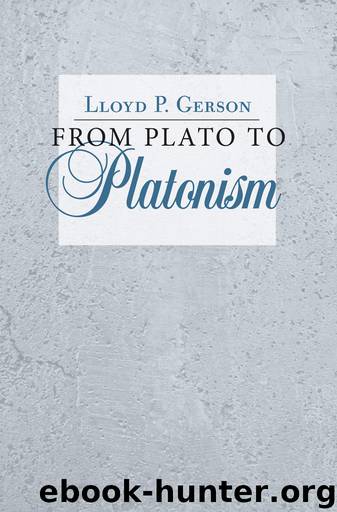From Plato to Platonism by Gerson Lloyd P.;

Author:Gerson, Lloyd P.;
Language: eng
Format: epub
ISBN: 9780801469176
Publisher: Lightning Source Inc. (Tier 3)
Published: 2019-08-25T16:00:00+00:00
Skepticism, Rationalism, and Platonism
Sextus reports that Arcesilaus was alive to the criticism that a Skeptic who withheld assent to all propositional claims could not conduct ordinary life without contradicting himself. For in acting, the Skeptic—implicitly or not—must assent to some propositions, namely, those the presumed truth of which makes his behavior rational. Arcesilaus is reported to have held
that he who suspends judgment about everything regulates choices and avoidances and, generally, actions by reasonableness, and proceeding according to this criterion, will act correctly. For happiness arises because of prudence, and prudence resides in correct actions, and a correct action is that which, having been done, has a reasonable defense. Therefore, he who adheres to reasonableness will act correctly and will be happy.23
It was a commonplace even in antiquity that Arcesilaus’s acknowledgment of the possibility of reasonable behavior undercut his principled skepticism. It seems likely that Aenesidemus’s effort to revive a pure, uncompromised ‘Pyrrhonian’ skepticism was aimed precisely at such apparent backsliding.24 We ought to realize, though, that the proposed skeptical criterion of action is not a criterion of truth. A course of action is not rendered less reasonable just because it fails to achieve its goal. That which is reasonable could not be a criterion of truth since ‘the reasonable’ is not used to justify a claim to truth as if it were a kind of evidence. If this is so, in what sense is ‘the reasonable’ a criterion?
In order to answer this question, it will be useful to have before us the famous passage from Plato’s Timaeus in which the principal interlocutor, Timaeus, declares that physical science can only be a “likely story” (εἰκός μῦθος):
Again, these things being so, our world must necessarily be a likeness of something. Now in every matter it is of great moment to start at the right point in accordance with the nature of the subject. Concerning a likeness, then, and its model we must make this distinction: an account is akin to that of which it is an account: an account of that which is stable and secure and discoverable by thought will itself be stable and incontrovertible (and insofar as this is possible and it belongs to an account to be irrefutable and unchangeable one ought not to fall short of this); while an account of that which is made in the image of the other but is only a likeness, will itself be only likely, standing to accounts of the former kind in a proportion: as being is to becoming so is truth to persuasion. If, then, Socrates, in many respects concerning many things—the gods and the generation of the universe—we prove unable to give accounts that are in every way consistent with themselves and exact, you shouldn’t be surprised. If we can provide accounts no less likely than others, we must be content, remembering that I who speak and you my judges are only human, and consequently it is fitting that we should, in these matters, accept the likely story and look for nothing further.
Download
This site does not store any files on its server. We only index and link to content provided by other sites. Please contact the content providers to delete copyright contents if any and email us, we'll remove relevant links or contents immediately.
| Africa | Americas |
| Arctic & Antarctica | Asia |
| Australia & Oceania | Europe |
| Middle East | Russia |
| United States | World |
| Ancient Civilizations | Military |
| Historical Study & Educational Resources |
Mythos (2019 Re-Issue) by Stephen Fry(1483)
Alexander the Great by Robin Lane Fox(1287)
On Sparta (Penguin Classics) by Plutarch(1122)
Antigone Rising: The Subversive Power of the Ancient Myths by Helen Morales(1092)
Persian Fire by Tom Holland(1025)
The Last Days of Socrates by Plato & Christopher Rowe & Plato(971)
The Classical World: An Epic History From Homer to Hadrian by Robin Lane Fox(967)
Cicero by Anthony Everitt(912)
The Athenian Constitution (Classics) by Aristotle(885)
Antigone Rising by Helen Morales(791)
The Greek World(779)
The Riddle of the Labyrinth(747)
The Story of the Greeks (Yesterday's Classics) by Guerber H. A(727)
The Eudemian Ethics (Oxford World's Classics) by Kenny Anthony(710)
The End of the Bronze Age by Robert Drews;(693)
The Homeric Hymns (Penguin Classics) by Homer(679)
Guide to Greece by Pausanias(678)
Lords of the Sea: The Epic Story of the Athenian Navy and the Birth of Democracy by John R. Hale(677)
Astrology and Religion Among the Greeks and Romans by Cumont Franz(647)
